
As I was randomly going through youtube clips a few days ago, I came across the above video of a group of Sikh children in Fremont, who learn kirtan in classical raags. Despite the poor audio, its obvious that they are good and I know this also from having heard them (and some of their contemporaries) in person – they are GOOD.
A couple of weeks ago Jodha reported on an article that brought to light the fact that Sikh children are practicing the tradition of kirtan, but what I think we didn’t discuss there is how this generation of Sikh musicians has really become one of classical musicians, learning stringed instruments of old and performing keertan in the Classical or raag framework. The growth has been obvious, especially in recent years – with the rise of institutions such as the The Raj Academy in Great Britain and the Gurmat Sangeet Department at Punjabi University Patiala, which specialize in providing instruction in traditional (classical) kirtan, and even the Miri Piri Academy in Amritsar of which the Chardi Kala Jatha (classically trained professional Sikh musicians who happen to be American in nationality) is a product.
 I know, from personal experience, that Sikh student organizations are always looking for a way to “get involved” and participate in a good cause. So, when I read about a recent initiative encouraging this type of active involvement, I cheered (abeit silenty… and to myself). The Sikh Spirit Foundation is an organization dedicated to promoting sikh values through education. In line with this mission, the Foundation recently launched a contest looking for project ideas which could help sikh education or our local gurdwaras.
I know, from personal experience, that Sikh student organizations are always looking for a way to “get involved” and participate in a good cause. So, when I read about a recent initiative encouraging this type of active involvement, I cheered (abeit silenty… and to myself). The Sikh Spirit Foundation is an organization dedicated to promoting sikh values through education. In line with this mission, the Foundation recently launched a contest looking for project ideas which could help sikh education or our local gurdwaras.
Help us assist the Sikh Community. Tell us how you would spend $25,000 to improve Sikh education or your local gurduara for a chance to win an iPod!
Submit two written paragraphs explaining what you would do and how it would help the Sikh community. Ideas will be judged according to feasibility, impact and need.
The Sikh Spirit Foundation intends to pursue the winning idea this summer by inviting the global community to submit proposals for the project. The Foundation will select and fund the best proposal among the submissions. [link]
Some of the organization’s grantees include: Ensaaf, Gyan Sewa Trust, Nanakshahi, Sikh Coalition, SikhNet, Sikh Research Institute, and Ujjaldidar Singh Memorial Foundation.
We’ve previously discussed involvement in the Sikh cause and lac(k)tivism – so it would be great to hear how youth and student organizations take the opportunity to suggest solutions to problems in gurdwaras and provide ideas for improving sikh education. Whether we acknowledge this or not, we are building a world today where our children will live tomorrow. To see the positive impact, it really comes down to how much we are willing to invest in our community today. We encourage you to go directly to the website to read submission guidelines – however, if you’d like to leave some thoughts here too – we’d love to hear your ideas!
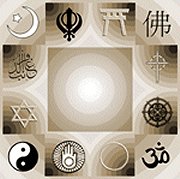 Growing up where I did, singing hymns and listening to the Our Father, Who Art in Heaven prayer were a daily occurrence. There was only one religion taught in my school. It was a point of discontent for those of us who followed other faiths and after years of students petitioning to be exempted from such morning meetings, my school reluctantly made exceptions for us. My school was a public school but it was also in England where separation of church and state did not exist.
Growing up where I did, singing hymns and listening to the Our Father, Who Art in Heaven prayer were a daily occurrence. There was only one religion taught in my school. It was a point of discontent for those of us who followed other faiths and after years of students petitioning to be exempted from such morning meetings, my school reluctantly made exceptions for us. My school was a public school but it was also in England where separation of church and state did not exist.
I don’t have a problem with teaching religion in schools, actually I think religion should be discussed at school but practice should not enforced. I do recognize that this raises the question of Sikh-based schools where religious education is provided in accordance with the Sikh faith. However, I will emphasize that these faith-schools are private schools and children often have a choice to attend those institutions.
It seems that the concept of separation of state and church has in effect reduced the amount of time/effort which is spent on teaching religion in schools. A recent article discusses a school in Modesto, California which has decided that learning about world religions is an important subject and in fact, have even made it a graduation requirement.
Johansen High School in Modesto, California, sounds like any other, until the sacred Hindu sound – “ommmmmm” – vibrates from history teacher Yvonne Taylor’s classroom. Today, she’s talking about Hindu ideas of the cycle of death and rebirth. This nine-week course for ninth graders teaches the fundamental beliefs of Christians, Muslims and Confucianists, as well as Hindus, Buddhists, Sikhs and Jews – all tied in with the history of religious liberty in the United States. [link]
As an UPDATE to my post a couple weeks ago, the Sikh Coalition has released the “2008 Presidential Elections Voter Guide For Sikh Americans”. P.S. McCain never responded … the guide contains some of his answers collected from outside resources (the Coalition became our #1 research assistant)!
According to the Sikh Coalition:
Our candidate questionnaire was provided to both the major party candidates in November 2007. Since then, the Sikh Coalition has provided all candidates multiple and repeated opportunities to answer its questionnaire. Our Voter Guide reflects the answers of the candidates who responded to our questionnaire.
The Sikh Coalition’s Sikh American Voter Guide includes information about how and where to vote on Election Day, summaries of proposed laws that affect Sikh interests, and the presidential candidates’ answers to our questionnaire. Of the 13 candidates running for president of the United States, a total of five responded to the Coalition’s questionnaire – including one of the two major party candidates.
The 25-page guide-book has a brief biographical section on all 13 candidates running for President, along with pictures (Prabhu Singh Khasla … Ralph Nader is represented)! In addition, responses from the candidates on questions addressing:
1) Relationship With Sikhs
2) Hate Crimes
3) Religious Profiling
4) Employment Discrimination
5) Discrimination
6) Asylum
7) Immigration
Check it out! Let’s us know what you think! Make copies and get them out to your sangats at local Gurdwaras before next Tuesday!
Vote On Tuesday (11/04/2008)! You can find your local polling place through Google here!


As the end of election season nears, the months of intense election coverage can get overwhelming. Hearing basically the same messages from both sides gets old. But one thing that’s been remarkable for me to see this election season is the level of civic engagement from a broad spectrum of civil society. For example, the kids in the above video sing a non-partisan song. Check it out. Half of them sing and dance for McCain and the other half for Obama (except for one stanza where they all sing for the Left, not sure why). These 7th grade students from the Ron Clark Academy in Atlanta just made election season enjoyable.
Obama on the left
McCain on the right
We can talk politics all night
And you can vote however you like
You can vote however you like, yeah
Some ideas are just better communicated through modes other than writing. Theatre, through the unfolding of a story and through the body language of its actors, can sometimes convey meaning and ideas more effectively than just written words alone.
Some Sikh youth from Rockland, MD have decided to use theatre to engage non-Sikhs in learning about Sikhs- a wonderful idea.
Two plays are being planned for the fall expressing themes of diversity, mutual respect, interfaith and justice. They will both be staged on Saturday December 13, 2008 at the Wooten High School in Rockville, Maryland.
Where did this idea come from?
Last fall, Guru Gobind Singh Foundation had some of its kids take part in a play The Lorax, a musical adaptation from the famous Dr Seuss story book which was staged by kids from many different faiths. This play, adopted to create awareness about environment, was coordinated by the Interfaith Conference of Metropolitan Washington and was staged by the Children’s Theater Company of New York.
After going through this experience, GGSF decided to form the Rockville Chapter of Children’s Theater Company last May to explore the possibility of staging a play depicting the concepts of Guru Granth Sahib. Dedicated to “Building Character Onstage”, the Children’s Theatre Company (CTC) of New York develops in children and youth a keen sense of citizenship while introducing them to the incomparable magic of theatre through their full participation in the creation and performance of musicals and plays. [link]
Heads-up friends, the season of the “Spinning Wheel Festival” is about to begin across North America this autumn. Celebrating Sikh films and art, the first stop will be in New York City on Saturday, October 04, 2008 at the Asia Society & Museum (p.s. that’s next Saturday). Buy your tickets NOW! The wonderful Rabbi Shergill will be performing at the opening gala (yes I am really biased here … I heart Rabbi Shergill) and DJ Rekha will be literally “spinning” at the after party.
Films a the NYC festival will range from documentaries on Pahelwani (i.e. Panjabi wrestling) and Kaba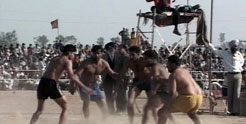 ddi-playing Canadian police officers to issues affecting the Sikh community from 1984 and post-9/11 hate crimes. There will also be short and feature films. For example, one on a young boy’
ddi-playing Canadian police officers to issues affecting the Sikh community from 1984 and post-9/11 hate crimes. There will also be short and feature films. For example, one on a young boy’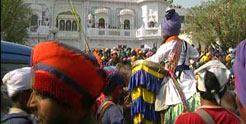 s struggle to keep his hair while his family fears the obstacles he will encounter and another on “… a young Sikh doctor struggling with the inequities of the American Health System and ultimately his own identity”. The Holy Duels of Hola Mohalla is a film looking at the Khalsa Panth.
s struggle to keep his hair while his family fears the obstacles he will encounter and another on “… a young Sikh doctor struggling with the inequities of the American Health System and ultimately his own identity”. The Holy Duels of Hola Mohalla is a film looking at the Khalsa Panth.
The films seem interesting both in content and presentation. The stories are grounded in the realities many of us encounter everyday. You can get a full listing of the films and their synopses here.
In the past, I have attended the “Spinning Wheel Festival” at one of its many North American stops and found it a great space for artists and art-enthusiasts to be exposed to Sikh creativity. I remember there being a panel discussion with the directors and the audience. We don’t have too many of these creative opportunities in our community even though we spend plenty of time and space advertising foreign medical schools in Poland, China, and the Caribbean.
I have found that some films are really hit or miss at these festivals, but it’s expected sense the focus is on cultivating and inspiring creativity; while, building a permanent Sikh film festival for years to come. Cash prizes are awarded to the “bests” in various categories. I have been told that the listing and quality of films varies across the different North American stops.
At the end of the day why not go, especially if it’s close by. I personally think it’s worth a visit as an act of supporting Sikh arts and learning about the various issues affecting our community. Sometimes we get too caught up in our own worlds and don’t realize these issues are taking place or we are in amidst of them and they become normal parts of our lives leaving very little room for reflection or exposure to others’ perceptions. Thus, it’s an 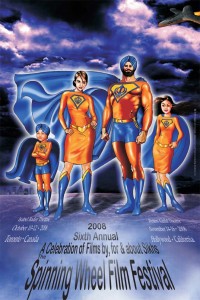 opportunity to get a fresh/new look at various issues.
opportunity to get a fresh/new look at various issues.
Lastly, the arts, from painting and photography to films and music, are our community’s soul! They help us speak in ways we can’t always articulate. So go save your soul and attend a Sikh artistic event! 
Okay, enough of the attempt at convincing … the other North American stops will be:
- Toronto, Canada from October 10-12, 2008 at the Isabel Bader Theatre.
- Hollywood, California from November 14-16, 2008 at the Writers Guild Theatre.
Are ya’ll thinking of going? What have your experiences been at the various Spinning Wheel Festivals? Does anyone know of other North American stops?
p.p.s. The Toronto and Hollywood poster is really interesting isn’t it … a conversation in of itself!
I got this cute video link via ASATA and wanted to share it with TLH. It talks about Italy’s desi-Sikh minority, relations between Italians and Sikhs, and the role of Sikhs in Italy’s cheesemaking industry
Update: wow, I did an AWFUL job of summarizing SRI’s first webinar. (Apologies to the good folks at SRI) Here’s a better summary:
Sikh Theology – A Gurmat Framework: The first session comprised of introducing an approach to Sikhi and recognizing how Guru Nanak Sahib revolutionarily delivered a message of Oneness through illustrating a direct connection between ideas and practice. We engaged in understanding what ‘Guru’ means in the Sikh context and how we can begin to comprehend the Guru’s wisdom, Gurmat. To develop this understanding, three facets of bani (scripture), tavarikh (history) and rahit (lifestyle) were introduced. The greatness of a religion is when harmonious balance between Ultimate reality and visible form is exemplified thru the aforesaid facets. We concluded with Puran Singh’s rendering on the Guru’s vision, “It sweetens you and your sweetness sweetens all life around. At your sight, the lamb and the tiger must drink at the same pool.”
And some info on session 2:
Bani – The Message: In session two, we continued to build on our understanding of the Guru’s message; We engaged in actively learning about the scriptural canon, the Guru Granth Sahib. In covering topics as the compilation, contributors, structure, language and content of Guru Granth Sahib, we tackled questions such as, “How do we know Guru Granth Sahib is the Guru?” and “What is the Sabad Guru?”; thus, facilitating and inspiring us to continue to build our personal relationship with Guru Granth Sahib.
And 3:
Tavarikh – The Revolution: Having concentrated on the written form of our Guru’s message (Bani) last week, this week in session three, “Tavarikh – The Revolution”, we will turn our focus on to how our Gurus exemplified The Message. We will walk through the lives of Guru Nanak Sahib through Guru Gobind Singh Sahib and try to understand them through a social, political, economic and spiritual framework. We will cover a range of issues, from touching on the ramifications of negating the need of a Divine intermediary, to the economic center created by the Guru Sahibs, to the activism of both social and political kind. In surveying the inspiring history of our Gurus, we hope to remind ourselves of how relevant, active and exemplary the revolution of Sikh? is.
Dr. Pashaura Singh, Professor at University of California, Riverside, was recently appointed to its Dr. Jasbir Singh Saini Chair in Sikh and Punjabi Language Studies. However, not without controversy. There have been several incidents since his inception to the Chair where members of the Sikh community have challenged his appointment because of Dr. Singh’s interpretation of the Sikh scriptures.
Sikhs believe the scriptures were revealed to a series of gurus…those revelations in the form of 6,000 hymns were compiled in 1604 by the fifth guru, Guru Arjan, and became the holy scriptures. Pashaura Singh’s thesis and subsequent research are based on a manuscript that surfaced in 1987 that he believes is a draft of the 1,430-page document compiled by Guru Arjan. Singh says the so-called 1245 manuscript, part of the rare book collection at Guru Nanak Dev University, includes sections that are blank and others that have been crossed out, showing evidence of having been edited. [link]
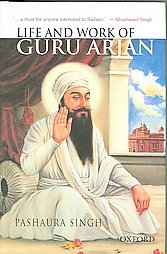 The story goes back many years. Singh, coming from the University of Michigan, was hired in 2005 to teach Sikh and South Asian religious studies. While at that time the chair position was not official, Dr. Singh was recruited with the promise of a potential endowed chair that would provide him with financial support for research. At that time, members of the Sikh community expressed concern about Dr. Singh’s appointment stating his research was problematic and challenged traditional Sikh views. Another issue stemmed from the fact that Ellen Wartella, executive vice chancellor and provost, assured the community in writing that while Singh would teach religious studies “it has been determined that he will not hold this chair.” The community is upset that the university went back on its word.
The story goes back many years. Singh, coming from the University of Michigan, was hired in 2005 to teach Sikh and South Asian religious studies. While at that time the chair position was not official, Dr. Singh was recruited with the promise of a potential endowed chair that would provide him with financial support for research. At that time, members of the Sikh community expressed concern about Dr. Singh’s appointment stating his research was problematic and challenged traditional Sikh views. Another issue stemmed from the fact that Ellen Wartella, executive vice chancellor and provost, assured the community in writing that while Singh would teach religious studies “it has been determined that he will not hold this chair.” The community is upset that the university went back on its word.
Today, members of the Sikh community are still upset about Dr. Singh’s appointment and are arranging a peaceful protest on the university grounds on September 26th, 2008.
The idea that the scriptures were edited or changed is blasphemous to traditional Sikhs. “If this is true, then the revealed word of God is not the revealed word,” said Dr. Baljeet Sahi, an Altadena veterinarian and president of Sikhs for Preservation of Sikhism and Sikh Heritage. Sahi called the 1245 manuscript fraudulent and said it was obtained from a scrap dealer. He said it may have been written by one of the guru’s rivals, who started a parallel tradition after he was denied a guruship. [link]


